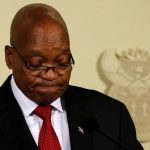New Books | Balance of Power
President Ramaphosa’s first speech as head of the country referenced the famous Hugh Masekela song Thuma mina, but the speech writer who used the lyrics meant them for Zuma.
Author:
11 March 2020

This is an excerpt of Qaanitah Hunter’s Balance of Power: Ramaphosa and the Future of South Africa (Kwela Books, 2019).
Thuma mina
When Ramaphosa read out the lyrics of the legendary musician Hugh Masekela’s Thuma mina song in his maiden address as head of state in February 2018, those around him had no idea that he was about to create the slogan of his incumbency. It would be the catchphrase of his tenure and would fuel a political momentum. It was his amandla and awethu. It was his “Yes we can” moment. Thuma mina was a political slogan that found its way into civil society and soon became a metaphor of hope and renewal both in the ANC and in society generally.
There was an electric current running through the National Assembly that Friday evening after a tumultuous week that saw Zuma eventually resign as president – albeit begrudgingly – and Ramaphosa elected his successor in a unanimous vote in the Assembly. Ramaphosa’s first speech as president of the Republic injected the country with a level of optimism unknown for over a decade. Thuma mina captured a spirit that unified all sides of the political divide.
“Allow me to recall the words of the late great Bra Hugh Masekela. In his song Thuma mina, he anticipated a day of renewal, of new beginnings,” Ramaphosa said. By that point in his speech, Ramaphosa had spoken of his new dawn, and of his determination to fix the state. But it was the lyrics of Masekela’s 2002 hit song that gave life to Ramaphosa’s vision.
The standing ovation from both sides of the political aisle captured the optimism surrounding Ramaphosa’s rise to the presidency. Masekala’s words aptly fitted the mood of the nation and would for long remain engraved in people’s minds.
Related article:
But this reference to Masekela’s song in Ramaphosa’s address to the nation almost did not see the light of day. His advisers didn’t believe that these words would best fit probably the most important speech of Ramaphosa’s political career, his first address as president. It turns out that the reference to Thuma mina and “I wanna lend a hand” was part of a draft of the address initially penned for former president Jacob Zuma by a presidential staffer who had no idea that by the time the speech was delivered, Zuma would no longer be president of the country.
When Ramaphosa took his oath of office and then sat down to prepare his address to the nation the next evening, it seems two well-respected advisers of the new president, Steyn Speed and Advocate Nokukhanya Jele, objected to the Thuma mina reference in the draft. They were sceptical about the wisdom of Ramaphosa quoting song lyrics in this crucial speech. As it happened, the reference to the song was only reintroduced less than 24 hours before Ramaphosa delivered his speech.
The story of the genesis of the Thuma mina quote is best chronicled by Wonderboy Peters, a speechwriter who had been appointed to the office of deputy president three years previously. I tracked down Wonderboy, who has since left the presidency, and he explained that the Thuma mina reference was something he wrote with Zuma in mind. It would, he felt, lift the mood of the country at a time when Zuma’s future hung in the balance. “I thought people would say, ‘Let’s listen to the president’, when they heard these words,” he said to me.
Related article:
Wonderboy described how late in January 2018 he was told that both Zuma’s and Ramaphosa’s offices would be working jointly on the state of the nation address primarily because there were effectively two presidents, one of the state and the other of the governing party. I suspect that by then the presidency was unsure which of the two would deliver the address as talks to have Zuma resign from office were already at an advanced stage. Wonderboy went on to say that in the three years he had worked for the presidency, he had never been involved in assisting President Zuma’s office draft the state of the nation speech.
“Together with the political adviser Steyn Speed and Busani [Ngcaweni, who now heads the policy unit in the presidency], we began exploring ideas. Departments submit volumes of their achievements, and we agreed we should try to give the nation more than just government’s scorecard of the previous year,” Wonderboy’s written account reads. He said his instinct suggested that he should dig up more on Hugh Masekela to find new imagery and fresh metaphors for the address as the jazz legend had just died that January. “I heard Thuma mina a long time ago on TV, but I couldn’t remember it. I listened to all of his songs and I was losing hope until I found the song,” Wonderboy recalled.
By the time he was done with his first draft, he had no idea that late on Valentine’s Day Zuma would utter the words “I have therefore come to the decision to resign as president of the Republic with immediate effect”. So he penned the speech for Zuma. “As I was looking for a theme, I knew it had to be something special given the many recent challenges that his presidency had faced.” Wonderboy rightly observed that people don’t generally remember the whole state of the nation address but are generally left with just one memorable line. President Thabo Mbeki excelled in doing so, not only in his Sonas, but in many of his speeches. There’s normally one central idea that lingers on. Think about “all hands on deck”, “business unusual”, “I am an African”.
Wonderboy trawled through old Mbeki speeches and even Madiba’s memorable ones. He read and read. “I wanted some gold for Msholozi [Zuma]; something truly extraordinary and transcendental. As a human being, he had gone through a lot of pain, had been humiliated, and each day there were concerted attempts to ridicule him and question his legitimacy as the president,” he wrote, again thinking he was drafting a speech for Zuma.
It was Madiba’s 1996 state of the nation address with the idea of “new patriotism” that caught Wonderboy’s eye. He believed if Zuma quoted it, people would pay attention. “Sometime, far back, I had seen on TV Hugh Masekela singing Thuma mina and it left an impression. But strange enough, I struggled in my mind to recollect which of the Masekela hits had left this indelible mark. I knew it was not, for instance, Stimela or African Secret Society I was looking for. So, a long, demanding research process began. After nearly giving up, there came the title Thuma mina on my laptop … It immediately grabbed my attention. I downloaded the lyrics. I was nearly in tears to see how those words captured the burning issues of our time, and how this was closer to Madiba’s ‘new patriotism’ or ‘masakhane’.” So enchanted was he by the lyrics of Masekela that he sat in his office and downloaded the song, listening to it on repeat.
On Friday, 13 days before the address would be delivered, Wonderboy worked on the mood of the speech. “A few days after submitting my input for Sona, Steyn texted me and said he would not use the Thuma mina theme. He said he would explain to me later the reason why he wouldn’t. I was crushed. But I kept quiet and never shared my disappointment.”
To Wonderboy’s delight, Ramaphosa’s then acting chief of staff and now head of policy in the presidency, Busani, fought for the Thuma mina reference to be reintroduced. But there was still some debate about where in the speech it should feature for best effect. Eventually, Steyn placed those iconic lyrics at the tail end of the speech. “I was not in Cape Town, in Parliament, for his big day. I had given up that Thuma mina would be used, and there, at the end of the speech … boom. I recall this moment very well. President Ramaphosa did not disappoint. He excelled and owned the message, his message. He had internalised the words. He uttered them with deep conviction. Before he finished, there was a spontaneous and honest standing ovation. I was happy for him, for my country. The work had been done, and done very well,” Wonderboy recalled. As Ramaphosa quoted Masekela’s words, even the opposition benches stood up in applause.
Presidents give hundreds if not thousands of speeches in their lifetimes but there are only a few that become engraved in history because of the impact and influence they have. For Nelson Mandela, it was the “I am prepared to die” speech he gave in 1964 while standing for three hours in the dock facing the possibility of a death sentence at the conclusion to the Rivonia trial. Mandela’s “rainbow nation” speech given on the day he was elected president in May 1994 also stands out. For President Thabo Mbeki, it was the “I am an African” speech, which he delivered on the occasion of the adoption of South Africa’s new constitution in 1996.
Thuma mina may have been meant for Zuma, but Ramaphosa’s delivery of those poetic and powerful words has associated that sentiment indelibly with his political career as president. Marianne Thamm, a journalist at the Daily Maverick, referred to Ramaphosa’s reference to Masekela’s song as marking the start of the “send me era”. “Who knows what Hugh Masekela would have thought of Ramaphosa’s reference to Thuma mina, a song co-written with Sello Twala and gospel star Peter Mokoena. The president’s mention has since been universally read as a call for South Africans, deeply traumatised by the corrosive and self-serving Zuma era, to find new inspiration and hope in a common humanity, ubuntu, duty and service.”
Related article:
The impact of this message was best felt on the campaign trail where it became Ramaphosa’s personal message for the 2019 general elections. Almost weekly during the campaign, Ramaphosa would have meetings with white business leaders, speak to a cross-section of academics and engage with civil society in events across the country. It became clear that there was a willingness and desire in society for people to come forward and help rebuild the country. Thuma mina became Ramaphosa’s sales pitch to the electorate, inviting them to “send” him by giving him a firm mandate in the forthcoming general elections. It was also his rallying call to civil society and business to help the government sort out the unending challenges it faced. It reignited a sense of patriotism not felt in the country for well over a decade.
For Wonderboy Peters, Thuma mina became his own personal moment of triumph: the boy who had grown up in poverty had set the tone for the entire nation. It became his own moment of hope. For Ramaphosa, the words came to embody the spirit of his presidency.



